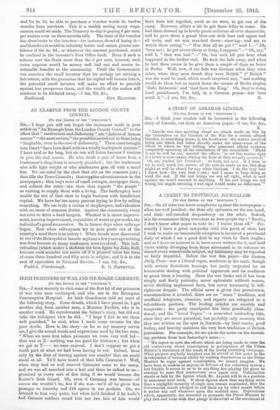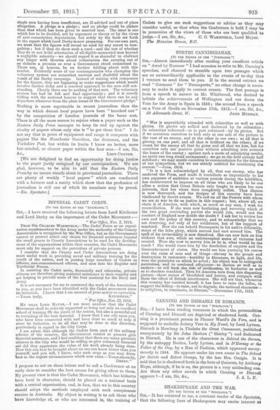A CREDIT TO PROVINCIAL JOURNALISM.
[To Els EDITOR OP TEE " SPECTATOR."]
Sre,—On all sides one hears complaints against the newspapers— often too well justified—for their oily optimism on the one hand, and their self-satisfied despondency on the other. Indeed, it is the commonest thing nowadays to hear people say " Really, I don't know what paper to take in ; I loathe them all." Per- sonally I have a great sympathy with this point of view, but
I wish to make an honourable exception in favour of a provincial daily of which I see a good deal in my visits to East Anglia ; and as I have no interest in it, have never written for it, and hold views widely diverging from those advocated in its columns on almost every conceivable subject, my testimony may be regarded as fairly impartial. Before the war this paper—the Eastern Daily Press—was a Liberal organ, moderate in the main, though with certain Socialistic leanings, but justly respected for its honourable dealing with political opponents and its readiness to grant them a hearing. Since the war broke out it has been
simply and finely patriotic, never optimistic without reason, never shirking unpleasant facts, but never wantoning in self- righteous despair. The official news is given due prominence, sensationalism is avoided, there are no " scare " headlines, and
unofficial telegrams, rumours, and reports are relegated to a subordinate position. The leading articles are sensible and temperate ; the party standpoint has been practically aban-
doned ; and the " Local Topics "—a somewhat misleading since they are never parochial, but probably only meaning that they are written on the spot in Norwich—by their sanity, good feeling, and honesty maintain the very best traditions of British journalism. For example, let me quote the notes on the recruit- ing problem from last Saturday's issue :-
" We regret to note the efforts which are being made to raise the old controversy about conscription in anticipation of the Prime Minister's statement of the result of the Derby recruiting campaign. What purpose anybody imagines can be served at this point in the development of national affairs by sending deputations to the Prima Minister to argue against conscription, we cannot imagine. We have been as zealous as anyone in defence of the voluntary system - but frankly it seems to us to be anything but playing the game te; attempt to raise that controversy over again now. Voluntarism stands or falls by the figures which Mr. Asquith will be in a position to announce next week. If those figures show that anything more than a negligible minority of single men remain unattested, then the Government stands pledged to call them up by other moans before it makes any call whatever upon the married men. Deputations which, apparently, are intended to persuade the Prime Minister to play fast and loose with that pledge in the event of the enrolment of single men having been insufficient, are ill-advised and out of place altogether. A pledge is a pledge ; and no pledge could be plainer than that which has been given to married men. The issue is one which has to be decided, not by argument or theory or by the views of anti-conscription deputations, but solely by the facts set forth in the report which Lord Derby is now preparing. For our own part, we trust that the figures will reveal no need for any resort to com- pulsion ; but if they do show such a need—and the teat of whether they do or not is the attestation of all eligible unmarried men beyond a negligible minority—we should regard it as shameful to obstruct any longer with theories about voluntarism the carrying out of as definite a promise as ever a Government stood committed to. There can, in honour, be no further fiddling about with this matter. Evidently some of our contemporaries who champion the voluntary system are somewhat nervous and doubtful about the result of the Derby campaign. Instead of waiting with composure for the figures, they are beginning to make suggestions which would involve further delay and a renewed approach to the mon still out- standing. Clearly there can be nothing of that sort. Tho voluntary system has had its full and final opportunity ; and it is merely trifling with the national honour to suggest that there can be any departure whatever from the plain terms of the Government pledge."
Nothing is more regrettable in recent journalism than the way in which decent local papers have been " knocked out " by the competition of London journals of the baser sort. There is all the more reason to rejoice when a paper such as the Eastern Daily Press manages to keep its end up against the rivalry of papers whose only aim is " to get there first." I do not say that in point of equipment and range it compares with papers like the Manchester Guardian, the Scotsman, and the Yoricshire Post, but within its limits I know no better, more fair-minded, or cleaner paper within the four seas.—I am, Sir, [We are delighted to find an opportunity for doing justice to the paper justly eulogized by our correspondent. We are glad, however, to be able to add that the Eastern Daily Press by no means stands alone in provincial journalism. There are plenty of weekly " local papers " which are conducted with a fairness and a sanity which show that the profession of journalism is still one of which its members may be proud. —ED. Spectator.]



































 Previous page
Previous page